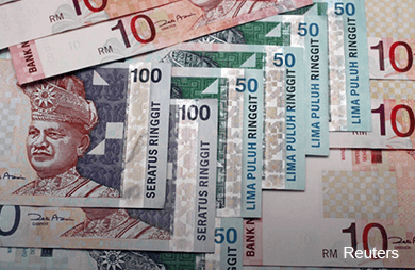
KUALA LUMPUR: The depreciation of the ringgit, the sharpest since the 1997/98 Asian financial crisis, has drawn investment money seeking shelter in export-oriented companies, such as the furniture and glove makers or the semiconductor firms that are earning US dollars.
On the flip side, companies whose products have a high imported content are falling out of favour as some of their share prices are being hammered as the local currency slides against the greenback.
But the adverse impact of the weak ringgit may not be as bad as perceived, thanks to the commodity prices that are heading south as well. For instance, airlines with low jet fuel and consumer goods are benefiting from the falling input costs, although they are imported content.
Nonetheless, the auto sector is not as fortunate ... likewise companies that have high foreign borrowings but earn local revenue.
“Basically, we found that there are four sectors that will be the losers of a weak ringgit. [They are the] automotive, consumer, airline [sectors], and those with foreign currency borrowings. But [the] impact on [the] consumer and airline [sectors] is lesser due to low raw material prices,” CIMB Research head of Malaysia research Terence Wong told the digitaledge DAILY.
Year to date (YTD), the value of the ringgit has weakened over 19.41% to 4.1990 against the US dollar.
Wong cited AirAsia Bhd as an example, saying that although the low-cost airline needs to import jet fuel, which is denominated in US dollar, but crude oil prices have been heading south since June 2014.
Last week, Brent crude fell as low as US$42.69 (RM179) per barrel on Monday amid growing concern over the decelerating economic growth in China — the world’s second-biggest economy — in addition to the expected increase in oil production. But the crude prices rebounded later, heading to the US$50 level.
Soft commodity prices aside, Wong said that natural hedge is another advantage to mitigate the impact from a weakening currency.
“Like AirAsia X [Bhd], it earns foreign currency-denominated revenue, so it can use the [foreign currency] revenue to pay its foreign debts,” he explained.
Meanwhile, companies such as Berjaya Food Bhd, in which the bulk of its revenue is derived from the Starbucks café chain, would not see a significant impact on its bottom line due to higher input costs resulting from importing coffee beans.
“Only about 30% of Berjaya Food’s cost of sales is due to the purchases of coffee beans, plus the prices of coffee beans globally have been coming down as well, so I don’t expect there is a significant impact on it,” RHB Research analyst Ahmad Shahir said when contacted.
According to Bloomberg data, benchmark one-month coffee contract prices have fallen over 24% YTD to US$1.21 per British pound.
Dutch Lady Milk Industries Bhd saw its net profit doubled to RM48.7 million for the financial quarter ended June 30, 2015, against RM24.2 million a year ago. The dairy firm attributed the improved earnings to favourable raw material costs.
In its latest results announcement, Nestle (M) Bhd also noted a favourable trend in some of the raw materials consumed that have positively contributed to a lower cost of sales.
Hong Leong Investment Bank Research head of research Low Yee Huap pointed out that Tenaga Nasional Bhd (TNB) is an example of low commodity prices helping to mitigate the adverse impact of high foreign debts as a result of a soft ringgit.
“Take Tenaga [Nasional Bhd] as an example, it took up foreign currency debts as well, but its situation is not as bad because coal prices have come down as well,” Low said when contacted through the phone.
As at May 31, TNB’s foreign currency debt stood at RM4.6 billion. The group’s total borrowings were RM24.07 billion, of which RM1.14 billion were short-term debts.
Bloomberg’s data reveals that benchmark European one-year coal contract prices have fallen 19.24% since the beginning of this year to US$53.1 per tonne last Thursday.
Nonetheless, the industry that has to bear the brunt of a softening ringgit is the automotive sector.
“Counters like UMW [Holdings Bhd] and Tan Chong [Motor Holdings Bhd] will be affected, as they need to import their cars and vehicle parts,” RHB Research chief economist Lim Chee Sing told the digitaledge DAILY when contacted.
In its latest quarterly results ended June 30, 2015, UMW Holdings’ net profit fell nearly 52% to RM68.4 million, from RM141.96 million a year ago. The group blamed it on the weak ringgit that had affected its operating costs and profit margins in the auto division.
CIMB’s Wong also commented that other than UMW Holdings and Tan Chong, the weakening ringgit also is affecting Berjaya Auto Bhd and DRB-Hicom Bhd.
This is because the costs of Berjaya Auto’s completely built-up cars are denominated in yen, which has strengthened over 19% against the ringgit since the beginning of this year.
Similarly, DRB-Hicom also has foreign currency cost exposure on its distribution of Honda vehicles, according to Wong.
DRB-Hicom slipped into a net loss of RM19.72 million in the first quarter ended June 30, 2015, from a net profit of RM107.84 million a year earlier, dragged by lower sales of motor vehicles in the current quarter.

This article first appeared in digitaledge Daily, on September 1, 2015.